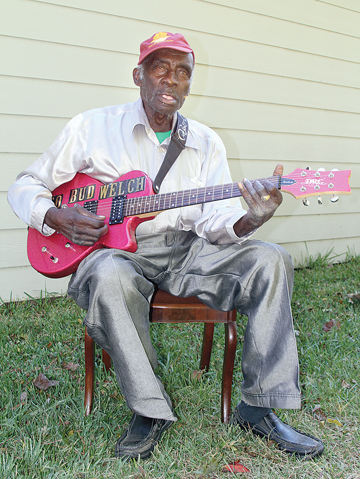Muddy Waters said to me once: "When I sing the blues, when I'm singing the real blues, I'm singing what I feel. Some people maybe want to laugh; maybe I don't talk so good and they don't understand you know? But when we sing the blues - when I sing the blues it come from the heart. From right here in your soul, an' if you' singing what you really feel it comes out all over. It ain't just what you saying, it pours out of you. Sweat runnin' down your face".
He is not a markedly eloquent man in conversation, but he never wastes words and what he has to say is always directly to the point. In those few sentences he summed up his attitude to the blues, what the blues meant to him and the effect that creating blues had upon him. Anything else is in a way, superfluous. Or perhaps, anything that one has to say about Muddy Waters is an amplification of these observations of his, if it is to have any value at all.
In more than one sense he is the ideal blues singer, for he epitomizes the blues for so many different groups of people. He is eminently sincere in what he does. He has no artifice, though at times he can be puzzling because he is so quiet in manner when he is not working. So his blues have meaning for him and they have depth; depth as great as his own complex personality. For those who live .by the blues his blues are an inspiration, and for those who are blues enthusiasts like ourselves, his blues are satisfying. I make the distinction because there is no real comparison between the significance of the blues within the black community and its significance to us who are so very much outside it. This is not to argue that our interest is in any way invalidated, but that it is of a different order. Most serious blues enthusiasts over here will know more about blues and the lives, work and recordings of the singers than the people who throng the small Chicago clubs, but the latter are there by reason of an inner compulsion and desire to share the music. For them the blues singer of the stature of Muddy Waters is a hero-figure, a "Race Man" as he would have been called a decade ago, who symbolizes achievement and success in his field - that of entertainment rather than just "blues". The blues enthusiast here may deplore the cultivation of the singers by the folknik clubs, the college circuit, the jazz festival. But the black man doesn't for these are significant inroads into a fairly well protected white dominated part of society. For the Mississippi black- who knows and hears every Muddy Waters record and is generally referred to in a matter of minutes - he is the perfect example of the "local boy makes good", the black rags-to-comparative-riches of the Great American Dream.












